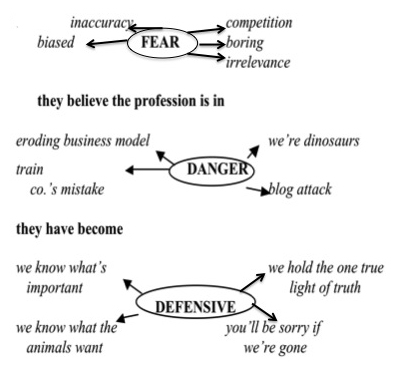On the last day, each participant reflected in silence, answering the following questions:
v What have you learned?
v What project idea do you want to pursue as a first next step?
v Who do you want to involve?
Chris
What I have learned
- Storytelling endures, the search for meaning endures, but…This doesn’t mean journalism will endure, or be recognizable in the forms where it appears today.
- Journalism takes many shapes: words on paper, images on a screen, bits on a computer, songs, stories from elders, messages on you phone. Many more people, therefore, are becoming journalists.
- The challenge for today’s journalist is to begin now to engage a next generation of journalists in the best and highest purposes of an endangered craft, even as new forms and platforms for journalism emerge.
Project ideas I would pursue
- The healthy journalist. By renewing the “inner journalist” I believe it possible to realize the “outer journalist” to tell more hopeful, complete, and meaningful stories.
- Elders and new explorers. I think today’s most experienced journalists can, and should, pair up with the emerging next generation of journalists – online, in new technology, etc. to share knowledge.
- New business models to support journalists. We must find ways to separate journalism from its current business model, or watch journalism wither.
Who would I involve?
- Change agents within journalism today
- Journalism fellowship programs
- Nieman
- Michigan
- Stanford
- Poynter
- Fetzer
- Open space
Jim
What I have learned
- I am not alone.
- New theories of change.
- New group techniques, e.g. open spaces.
- The field may finally be ripe for new seeds.
- Collaboration with Fetzer/Stephen/Peggy might be a better way for me to make a difference.
- I’ll have to re-think how I will spend my remaining time.
What project idea do you want to pursue as a first next step?
- Help design processes and occasions by which journalists and journalistic organizations – broadly defined – may learn, adapt, and help others to do the same.
Who do you want to involve?
- “Inside” stakeholders
- Outside/new/social stakeholders
- Other agents for change
Karen
What I have learned
- Compassion of the journalist for craft.
- Ties of journalistic craft to business model.
- New ways of communicating humanity and media literacy work.
- New reference material to use in grassroots media justice/democracy work.
- Deeper understanding of open space practice and concept.
What project idea do you want to pursue as a first next step?
- Journalist-to-community training to create open and active collaborations in newsgathering.
- Creation of “cultural” activities to engage the community in active journalism/storytelling.
Who do you want to involve?
- “Traditional” journalists-reporters
- Publishers
- News directors
- Bloggers
- Youth
- Grassroots
- Key legislators
- Public opinion leaders
Nora
- What I need to get over
- So cynical – can’t change
- Too touchy-feely
- Will only accept practical not spiritual
- Can a real difference be made?
What I have learned
There is a way
- To rethink
- To re-energize
- To restore
Journalists’ faith in themselves.
Give them campfires to tell stories around and to warm themselves.
Project ideas
- Propose/create/conduct after conference reflection/conversation sessions “J.A.”
- Start a storytelling site to contribute the stories.
- Balance the story – appreciate.
Scott Libin
Scott left the meeting on Friday evening. He answered the questions by e-mail.
What did I learn?
One of the things that interests me most is the notion that journalism is evolving along lines similar to past social phenomena. I’m fascinated by the notion that news reporting might be today where literacy was a couple of centuries ago: still in the hands of an elite, relatively small number of people, and on the verge of spreading throughout the population. It’s conceivable that the practice of journalism will, over the next several years, become as ubiquitous as the practice of reading and writing is now. It’s also noteworthy that, even in nations with the world’s highest rates of literacy, not everyone can make a living reading and writing. Similarly, I don’t believe that all journalism will be equally competent in the future. I believe the profusion of information sources will make even more valuable the role “traditional” news organizations play in helping consumers sort and analyze various streams of news.
What project do I want to pursue as a first next step?
I am both excited and concerned by the blogging phenomenon. I wonder — with some sense of urgency — what its role will be in the larger spectrum of information gathering, processing and distribution. Some of that is journalism; some is not. This is true of print, broadcast and online communication; blogs are no exception. What’s the financial model, if any, that can harness the positive power of blogging so that it isn’t just something people practice after hours, when they come home from their jobs at Wal-Mart? If blogs are to unseat “mainstream media” as the principal method by which consumers inform and govern themselves, how do the bills get paid? What happens to the stories that can’t be told incrementally and inexpensively by community-based journalists? I’m interested in further exploration of that question.
Whom do I want to involve?
I’d like to get some bloggers into the conversation. I don’t know specifically which ones, but I would hope some might be “recovering” MSM types like Andrew Sullivan. Others might be creations of the blogosphere itself — sources who had no outlet until technology made it possible for everybody to publish cheaply and easily. I’m less interested in those with narrow interests or political agendas to pursue, but they are a force to be reckoned with, and perhaps we should make room at the table for some of them, as well. (Of course I use the term “table” in the figurative sense only, as I realize such barriers violate open space!)

